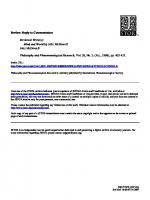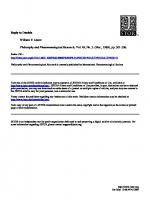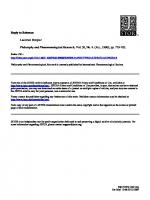
- Author / Uploaded
- O'Hear Anthony
Reply to Glassen
Anthony O'hear The British Journal for the Philosophy of Science, Vol. 35, No. 4. (Dec., 1984), pp. 377-380. Stable URL
1,192 27 80KB
Pages 5 Page size 595 x 792 pts Year 2007
Recommend Papers
File loading please wait...
Citation preview
Reply to Glassen Anthony O'hear The British Journal for the Philosophy of Science, Vol. 35, No. 4. (Dec., 1984), pp. 377-380. Stable URL: http://links.jstor.org/sici?sici=0007-0882%28198412%2935%3A4%3C377%3ARTG%3E2.0.CO%3B2-6 The British Journal for the Philosophy of Science is currently published by Oxford University Press.
Your use of the JSTOR archive indicates your acceptance of JSTOR's Terms and Conditions of Use, available at http://www.jstor.org/about/terms.html. JSTOR's Terms and Conditions of Use provides, in part, that unless you have obtained prior permission, you may not download an entire issue of a journal or multiple copies of articles, and you may use content in the JSTOR archive only for your personal, non-commercial use. Please contact the publisher regarding any further use of this work. Publisher contact information may be obtained at http://www.jstor.org/journals/oup.html. Each copy of any part of a JSTOR transmission must contain the same copyright notice that appears on the screen or printed page of such transmission.
JSTOR is an independent not-for-profit organization dedicated to and preserving a digital archive of scholarly journals. For more information regarding JSTOR, please contact [email protected].
http://www.jstor.org Sun Jun 17 05:34:35 2007
Reply to Glassen
377
REFERENCES O'HEAR,ANTHONY[1980]: Karl Popper: The Arguments of the Philosophers. Routledge and Kegan Paul. POPPER,K. R. [197z]: Objective Knowledge. Oxford University Press.
REPLY TO GLASSEN
T h e argument of Popper's in his [197z], pages 223-4, which I was criticising purports to show that we cannot rationally accept physical determinism because (i) physical determinism entails that everything that happens does so because it is necessitated by physical or natural law, (ii) hence our acceptance of determinism would be so necessitated, (iii) a rational belief is one that is accepted because it meets certain rational standards for belief, and (iv) a belief (in this case the belief in physical determinism itself) cannot be accepted both because it is necessitated and because it meets rational standards. T h e claim, repeated by Glassen in his [1984] is that if someone is physically determined to believe something (or to be in a certain belief state) then he cannot at the same time be in that belief state because he perceives the cogency of the belief. If a belief I am determined to accept is cogent, rational etc., this is at most a lucky coincidence and can have nothing to do with bringing about the belief in me. That this is Popper's point is reinforced by his longer discussion of the same argument in his [1982], pages 81-8, in which he admits the possibility of deterministic calculating machines which work in accordance with the laws of logic, but denies that an individual determined to believe something could in the full sense be believing rationally. He would not be believing because he 'freely judge(d) the arguments or reasons in its favour to be sound'. Popper and Glassen assert that beliefs cannot both be physically determined and accepted because they are rational. I do not base what I say in criticism of this assertion on any general doctrine to the effect that determinism and freedom of action are compatible. Indeed, as will emerge, I do not think that belief is much like free action, and I suspect that talk of belief in terms of freely judging that such-and-such, or a response to free enquiry and the like, has tended to obscure an important point about rational belief. Let us accept for the sake of argument that neurophysiological determinism is true, and also that all mental states are also brain states. My belief states are then neurophysiologically determined brain states. But why should any of this in itself make it impossible for me on occasion to survey some of my beliefs with a view to changing those that do not appear to me to be cogent, based on evidence and so o n ? For my beliefs, although all physically determined states, will still be of differing quality from the point CC
378 Anthony O'Hear of view of their rationality, according to whether they are backed up by my possession of good evidence or not, and the rest. Now, if in this survey I realise that a belief of mine is inconsistent with evidence I have, I will thereby be disposed to give it up. T h e brain state that constitutes this realisation will be the cause of my giving the belief up. So my giving it up will be because of my realisation that the belief is less than cogent, and because of the brain state. T h e two things are, on the view we are assuming, the same, so it is not always a question of either my being in possession of rational reasons for my beliefs or of my having a physically determined cause for them, as Popper and Glassen think. What perhaps lies beind Popper and Glassen's attempt to force an exclusive disjunction where determinists might wish to see an identity is the feeling that a determinist would be unable to make a valid distinction between a belief held because it meets a reasonable standard and one held on non-rational grounds, upbringing, indoctrination, prejudice and the like. Popper says that physical determinism leaves no room for the difference between brainwashing and learning, on the grounds ( I think) that the presumption of truth and rationality implicit in our use of argument cannot be explained deterministically or materialistically. Glassen implies that we could not explain a notion such as reasonableness from within a closed physical system. Now, I simply fail to see why someone should not (again be determined to) survey and examine the types of grounds on which people in his community hold their beliefs. Some will appear to lead to truth (correspondence with what is actually the case) more often than others. This person, let us say he is Glassen's D, would now be in a position to decide that some people (A, B, C) invariably held beliefs only on these truth preserving grounds, while others, E . . . N , and D himself, sometimes failed in this respect. Glassen would, I think, reply at this point that the grounds on which D decided that A , B & Cused truth-preserving grounds, for their beliefs, while E . . . N a n d he himself sometimes failed to do this would themselves be one he was determined to accept, and hence not rationally grounded. D would have to know what was true in order to distinguish between the 'good' strategies used by A, B and C and the 'bad' ones used on occasion by D . . . N, but all he can really know is what he is determined to think is true. D cannot know that the positions and beliefs A, say, accepts are reasonable or correct. Now, while I accept that all D's mental states are ex-hypothesi determined, there is no reason on deterministic grounds why D should be enclosed within an unbreakable circle of what he individually and idiosyncratically is determined to accept as true. He could (be determined to) select a set of statements, such as observational statements, on which there was community-wide agreement, and taking them as a basis of truth, examine which members of the community were most reliable in what they predicted would happen, before it did, retrodicted what had happened without
Reply to Glassen
379
themselves having direct knowledge of it, and so on. Recognising a community-wide set of basic truths, and recognising that the rest of the community corroborated him on the choice of such a set, D could then set about distinguishing those of his fellows (including himself) who do and those who do not use strategies for belief, perceptual and inferential, that generally and reliably checked out against the universally accepted set of truths. These strategies will determine what is to count as reasonable or unreasonable in belief. An underlying point on which I disagree with Popper and Glassen is on whether there are insuperable problems with thinking of people being physically determined to be in states whereby they examine and alter their beliefs and standards of evidence in the light of their truth and rationality, and whether the possession of these truth inducing standards themselves might not be given some sort of physicalistic explanation, say in terms of their general usefulness to the species in general and to those who pay particular attention to them in particular. But why might these possibilities not obtain? People who were physically determined to examine and to respect standards of reasonableness in belief would tend to have some advantages over others; and they would also arrive at some or most of their beliefs because of the neurophysiological state they were in that constituted this respect for reasonableness. It would then not simply be a matter of chance that their beliefs were in accordance with the evidence. Of course, we are looking at things here from a deterministic point of view, there remains a sense in which it would not be up to us whether we were rational, respectful of truth and so on, and there may be objections to this arising from other considerations. But what Popper and Glassen are attempting to show is not that determinism makes it impossible to say that our beliefs are rational in some strong sense in which we are ultimate masters of our fate, but that it makes it impossible to mean anything by speaking of belief held rationally or irrationally. I have been urging that this distinction-belief held rationally or not-could survive physical determinism, because one could still be physically determined to distinguish between beliefs held on good reasons and those held on bad reasons, and indeed be physically determined to hold some precisely because they were backed by good reasons, and to realise this. There thus seems nothing inconsistent in someone claiming that his belief in physical determinism is itself both determined in him and that it meets whatever standards of rational belief obtain in the area. In fact, as I said earlier, belief does not operate like free action: one significant difference is that the more rational a belief is and the more overwhelming the evidence in its favour, the less one would have any semblance of choice or discretion in regard to it. Descartes, whom Popper adduces as an ally in his argument against determinism, actually regards total rationality in respect of a belief as consisting in that full conviction that arises from the impossibility of believing otherwise, when confronted with a genuinely clear and distinct idea. Being compelled or necessitated to believe
380
Anthony O'Hear
something, then, it not necessarily a symptom of irrationality in one's belief. Indeed, if the necessitation is necessitation of the right sort, quite the opposite is the case. T h e physicalist can surely maintain that sometimes necessitation of the right sort is equivalent to one's belief having the right causal ancestry, and ultimately the right neural link-ups with the world. Popper and Glassen doubt whether the physicalist is entitled to speak of some causal ancestries being more appropriate than others, but so long as rightness is spelled out in terms of types of ancestries more likely than others to produce true beliefs, defined in terms of generally acceptable basic truths, there seems no reason to accept this. Of course saying that the determinist has the grounds available to make a distinction does not mean that he is necessarily able to apply it correctly in every case. It may be that he is determined to believe, wrongly as it happens, that his belief in, say, determinism is rational. But the case of Popper and Glassen depends on the determinist being unable to mean anything by calling a belief rational, and that they have not shown so long as the determinist is able to distinguish in the causation of belief between causation that is likely to be relevant to the truth of the belief and the causation that is irrelevant to it. T h e determinist must represent himself as determined to believe whatever he believes, but he may still be able to distinguish even in his own case between beliefs which had been caused in him by factors relevant to their truth and those which had been caused by irrelevant factors such as brainwashing, indoctrination and prejudice, and he may intelligibly (if not necessarily correctly) regard his belief in determinism as being of the former sort. A N T H O N Y O'HEAR
University of Surrey REFERENCES
GIASSES,P. [1984]: 'O'Hear on an Argument of Popper's', The British Journal for the Philosophy of Science, 35, pp. 375-77. POPPER,K. R. [1972]: Objective Knowledge, revised edition, 1979. Clarendon Press. POPPER,K. R. [1982]: The Open Universe. Hutchinson.









